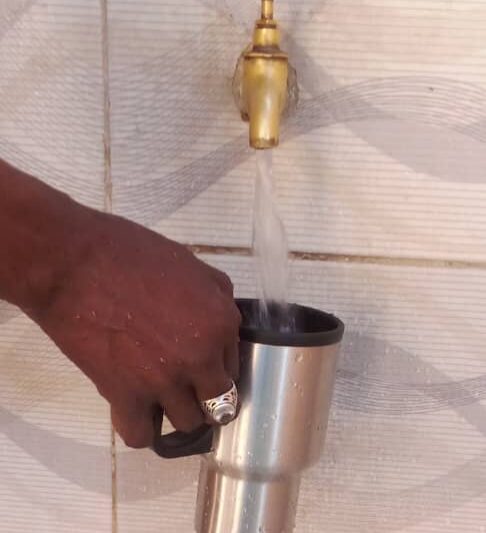Specialists say the minimum amount of water one should drink each day is two litres – but in Maiduguri many would rather drink tea than water.
Specialists recommend that people should drink a minimum of two litres – or preferably three litres – of water a day but most people in Borno State say that they do not drink much water when the weather is cold as it is now – and especially not if they are hungry.
One specialist told RNI that the preferred amount of water one should drink a day was a whopping 10 litres.
An insufficient amount of water can be bad for one’s health because it affects the kidneys, which remove waste and extra fluid from one’s body.
They also remove acid that is produced by the cells of the body and maintain a healthy balance of water, salts and minerals – such as sodium, calcium, phosphorus and potassium – in one’s blood.
Water keeps your temperature normal, lubricates and cushions joints, protects your spinal cord and other sensitive tissues and gets rid of wastes through urination, perspiration and bowel movements.
RNI spoke to residents of Maiduguri, the capital of Borno State, to find out if they kept to the recommended consumption of water every day.
Fatima Mohammed said: “During this chilly weather I do not drink water more than twice a day. It is too cold and I do not have the urge to drink water. It’s different in summer when the weather is hot. Then I get very thirsty and I drink more water.
“But I don’t like to drink too much water because then I have to go to the toilet often.
“I believe that you need more water when you are fully fed. But if you don’t have enough to eat, I find I don’t get thirsty. So I don’t drink water.”
Falmata Bukar Alau said: “During this kind of weather I usually drink water once a day, sometimes twice.”
She said she could not drink water more than twice a day when her stomach was empty.
“But during the hot weather because of the heat I have no choice but to drink water at every given chance.”
Mohammed Mustapha told RNI that he did his best to drink enough water every day, but he did not know if it was the recommended amount.
“I know drinking water is extremely important because it keeps me hydrated, but you need to eat well first.
“I have friends who do not drink any water for the whole day; others I know drink less than one litre of water in two days because they don’t have enough to eat. But for me, I drink a lot of water not only because I need it internally but also because my lips get dry and cracked and my urine gets highly concentrated if I do not have enough water.”
Dr Aisha Mustapha Bulu, a specialist at the University of Maiduguri Teaching Hospital, said ideally one should drink at least three litres of water a day which is the equivalent of six sachets of water.
“Some people drink tea throughout the day but that is not as good for you as water. Usually, they take sugar in their tea and too much sugar is not good for you. If people drink tea but they also drink three – or at least two – litres of water, they have nothing to fear.”
Dr Zanna Mohammed Tijjani, a senior registrar at the department of nephrology at the University of Maiduguri Teaching Hospital, said: “People don’t like drinking water during this cold season because they don’t want to urinate so often.
“Many people also don’t feel thirsty when it’s chilly. But they need to know that not drinking any water during the cold season, or even drinking just a small amount, can be dangerous to their health.
“On a daily basis one should drink 10 litres for the body to function optimally. I realise some people do not get thirsty in this weather, but I advise everyone to drink at least three litres of water even when the weather is cold.
“For those who prefer drinking tea instead of water, they should know that tea cannot replace water.
“Research has shown that water can be drunk cold or warm. Warm water doesn’t have any effect on a healthy person. So, one can drink the water at any temperature, whichever way they prefer it.”
Aysha Mustapha Kolomi









